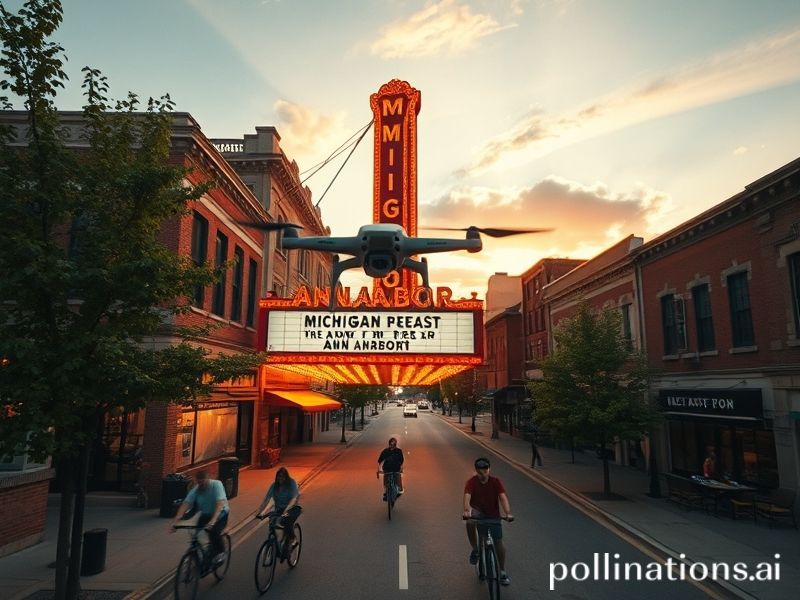Ann Arbor: The Tiny Midwestern Town Quietly Running the World (and Pretending It’s Just Here for the Pho)
Ann Arbor, Michigan, population 123,851 on a census day when nobody had anything better to do, has spent the last two centuries convincing the planet that a modest Midwestern grid of leafy streets and brick facades is, in fact, a geopolitical cheat-code. The rest of the world, distracted by flashier American metropolises, keeps missing the memo that this town quietly prints the software running your phone, the policy papers shaping your pension, and the next graduate student who will politely explain why your entire worldview is statistically obsolete.
Start with the obvious: the University of Michigan, a 200-year-old institution that behaves like a small nation-state with better landscaping. Its endowment—roughly the GDP of Barbados—has financed everything from driverless-car algorithms tested on snow-covered roads that resemble post-apocalyptic ice rinks, to a nuclear-research reactor whose only purpose seems to be reminding Iran that you can enrich uranium in a college town and still qualify for Whole Foods. Each year 7,000 international students arrive clutching suitcases and the conviction that Ann Arbor is merely a stepping-stone to New York or Silicon Valley; half of them are still here a decade later, arguing over Pho at 2 a.m. and trying to convince their parents that “Midwest” is not synonymous with “failed state.”
The city’s global footprint is almost insultingly disproportionate. Google’s original search algorithm? Conceived on a UM dorm ethernet cable back when Sergey Brin still mispronounced “quinoa.” Modern lithium-ion batteries? Thank the engineering faculty who looked at oil addiction and decided it lacked sufficient voltage. Even the anti-malarial bed nets swatting mosquitoes across sub-Saharan villages trace their R&D to an Ann Arbor lab where the biggest nuisance is squirrel interference. If the town ever seceded, half the developing world would notice before the U.S. State Department finished its coffee.
Of course, the city’s liberal self-image likes to pretend it’s above such vulgar power. City Council passes resolutions against climate change with the solemnity of monks, then returns to heated debates over whether the new bike lanes are a UN plot. Locals sip single-origin pour-overs while discussing carbon footprints, blissfully ignoring the fact their imported Ethiopian beans circumnavigated the globe in cargo jets that run on the same petroleum they voted to stigmatize. Hypocrisy, like the winter, is simply another season here—long, gray, and embraced with ironic knitwear.
Meanwhile, the world’s autocrats have learned to fear the town’s other export: data. When protestors in Hong Kong evade facial-recognition cameras, they’re often using open-source tools perfected by UM coders who once mistook tear-gas simulations for homework. Russian troll farms spend sleepless nights gaming algorithms first debugged in Ann Arbor basements, which feels oddly poetic: the Kremlin’s disinformation campaigns getting out-hacked by people whose previous act of rebellion was sneaking kegs into a dorm named after a prohibitionist.
Economically, Ann Arbor is the rare American city that didn’t mortgage its soul to Amazon fulfillment centers. Instead, it rents it to venture capitalists who speak in TED-talk cadences and believe “disruption” is a personality. The downtown skyline—three modest cranes, a medical complex, and one luxury condo that looks like a dishwasher tipped on its side—has become a Rorschach test for globalization. To European visitors it’s quaint; to Chinese investors it’s undervalued; to Detroiters it’s proof the suburbs are finally learning real-estate sarcasm.
And yet, for all its planetary influence, Ann Arbor remains endearingly mortal. The power grid still collapses during ice storms, the football stadium still sells out to watch teenagers concuss each other for academic credit, and the city’s most contentious geopolitical struggle remains: how to keep the deer from eating the organic kale. Somewhere in that paradox is the lesson the world keeps overlooking: you don’t need a skyline on fire to change the planet, just a library open past midnight and a population smug enough to believe knowledge still outranks money.
So toast the next breakthrough born on a snowy Tuesday in this overachieving hamlet. Raise your glass of Michigan craft cider—carbon footprint larger than a Mongolian herder’s annual output—and acknowledge the cosmic joke: the center of the universe is currently a college town with a squirrel problem and a Nobel laureate on every corner. The universe, like the students, seems perfectly happy to pretend it’s just passing through.







